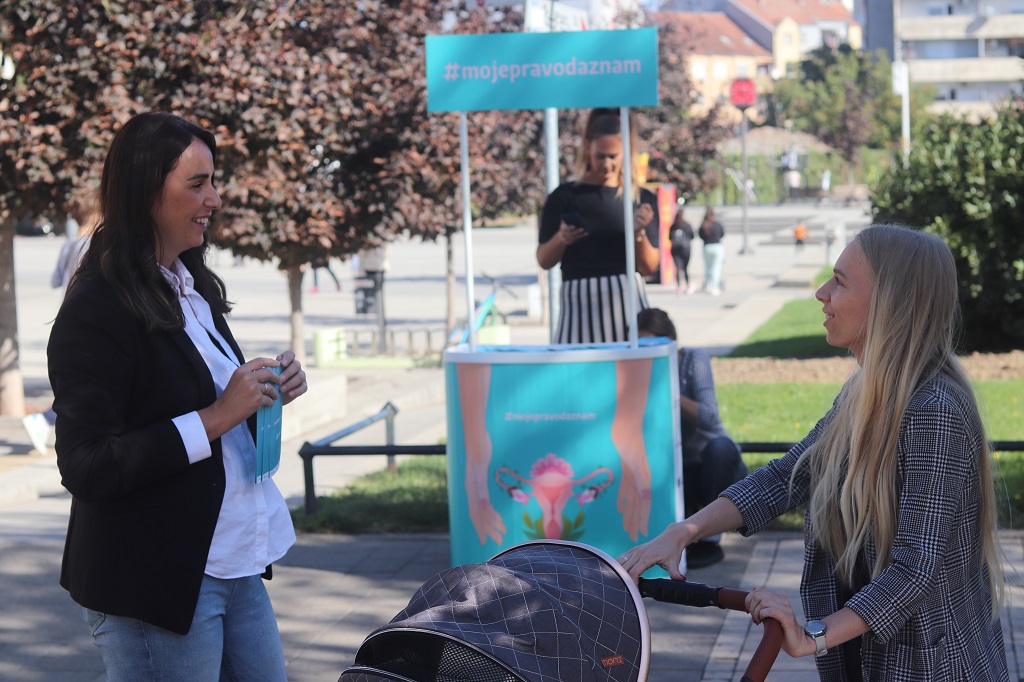Informed choices, empowered lives: #MyRightToKnow Campaign Empowers Serbian Women on Abortion Rights
Date:

The issue of inhumane treatment in maternity hospitals in Serbia gained prominence when Milica Filipović from Šabac, Serbia publicly shared her traumatic experience during an induced abortion procedure at an obstetrics and gynecology clinic in Belgrade at the beginning of last year. Subsequently, a cascade of testimonies emerged from numerous women across Serbia, revealing instances of similar identical inhumane treatment in various healthcare institutions throughout the country over the preceding decades.
Recognizing the gravity of the issue, the Belgrade Center for Human Rights (BCHR), a local civil society organization, launched the #MyRightToKnow Campaign to empower Serbian women by raising their knowledge and awareness on abortion rights. As part of the campaign, BHCR set off the #MyRightToKnow Caravan, visiting six cities in Serbia from mid-September to mid-October 2023 to educate and raise awareness of women about their rights as patients during their stay in obstetrics and gynecology clinics. The campaign was supported by UN Women Serbia within the framework of the EU funded project “Support to Priority Actions for Gender Equality in Serbia II”. Additionally, UN Women supported the launch of a new research on the “Attitudes and public opinion on the implementation of induced abortion procedures in health institutions”.
The #MyRightToKnow caravan traveled three thousand kilometers, visiting Kragujevac, Niš, Novi Sad, Užice, Belgrade and Šabac, where representatives of BCHR directly spoke with hundreds of women. Almost a thousand leaflets were distributed with information on the rights of patients during their stay in obstetrics and gynecology clinics and available legal protection mechanisms in case of violation of their rights.
Sanja Radivojević from BCHR says the campaign focused on the topic of induced abortions, as a tribute to the courageous act of Milica Filipović, and then also the thousands of women who supported her and testified about their "unbelievable" experience.
"We realized that we have to convey the message to women to stand up for themselves, even when they are vulnerable. Maybe then is the right moment for them to protect their rights. It is very important to emphasize that this is not a campaign against healthcare workers, it is the mean of empowerment of female patients and reminder for the doctors to remember their obligations”, says Radivojevic.
Last summer, by publishing a short video, the center wanted to bring the public closer to the trauma and suffering experienced by women who were exposed to inhumane treatment during the induced abortion procedure.
Furthermore, BHCR conducted a research involving interviews with 30 women from various regions of Serbia who had undergone induced abortions, while an additional 165 women participated by filling out an online survey. Respondents revealed a widespread lack of knowledge about what actions to take, where to seek assistance, expectations, the nature of examinations and procedures, and awareness of their rights. The majority of the women went through the procedure of induced abortion on their own, lacking the crucial support of healthcare professionals during the expulsion of the fetus. Disturbingly, in some cases, abortions took place in the hospital room in the immediate presence of other patients, in the restrooms or even in corridors. Also, a significant number of female patients were exposed to disparagement by health workers, who called them derogatory names, insulted or shouted at them.
The women who participated in this research stated that they knew three other women who had this traumatic experience on average, which speaks of a large number of them who, due to the sensitivity of the topic, are not yet ready or empowered to talk about it.
Nevena Marceta, project officer from UN Women Serbia says that this campaign is of great importance since it tackles a very sensitive topic which is a common experience among women in Serbia.
“In this way we encouraged women to stand up for their rights as patients in this extremely vulnerable situation. Every woman must receive adequate health care and support, no matter the circumstances. This type of experience can cause great traumatic consequences to women’s mental and physical health, so prevention of this type of situation is crucial”, says Marceta.
Belgrade Center for Human Rights will continue its support activities and empowerment of women who have gone through inhumane treatment in gynecological-obstetrical clinics in Serbia. The analysis with the conclusions of the research on the implementation of this procedure in Serbia, followed by recommendations for the improvement of practice in this area, was presented at the end of November 2023.